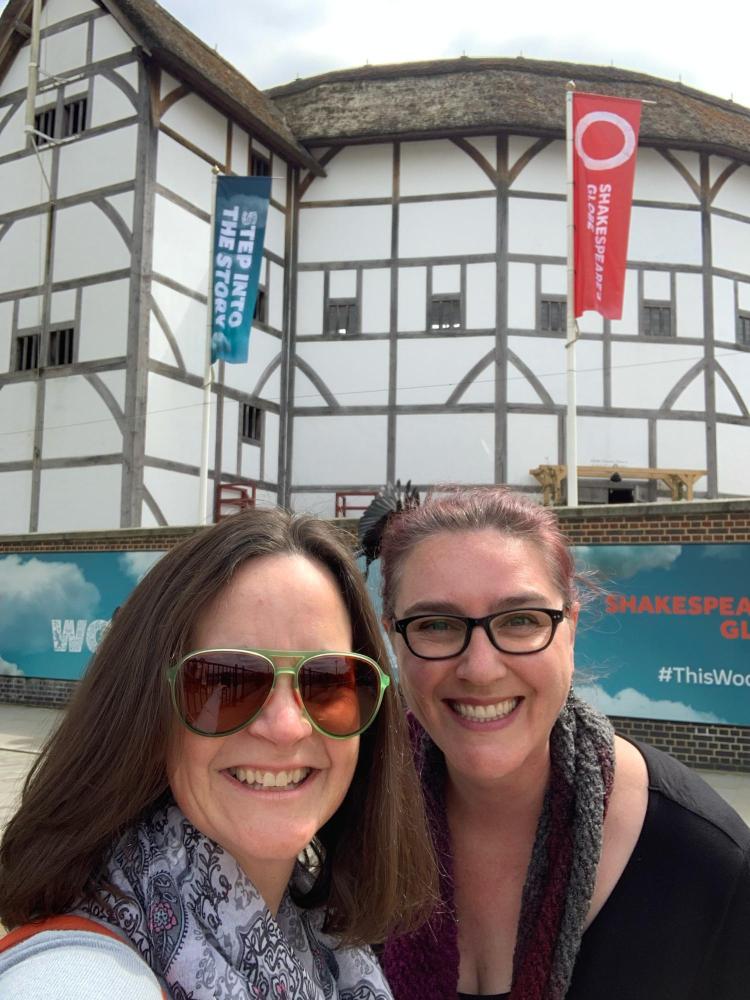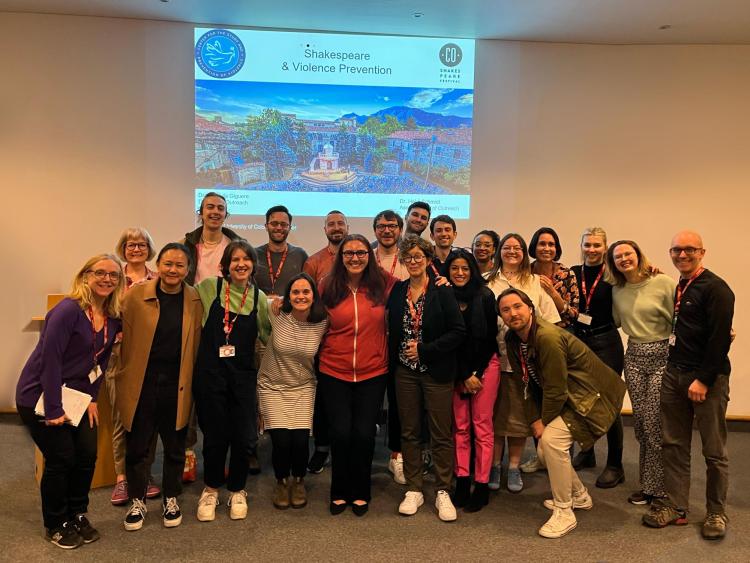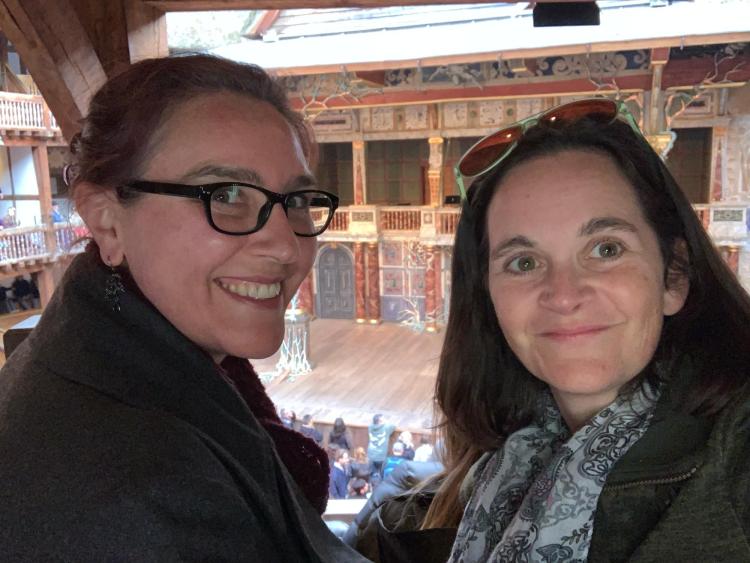Reducing violence, with help from The Bard
Colorado Shakespeare Festival staffers share Shakespeare & Violence Prevention program with scholars and practitioners in England, including at Shakespeare’s Globe theatre
Scientists largely understand what contributes to violence in schools and communities—and how to stop it. But actually putting that research into practice can be challenging.
Live theater can help.
That was the message the Colorado Shakespeare Festival’s Amanda Giguere and Heidi Schmidt shared with an array of Shakespeare scholars and practitioners during a weeklong outreach tour in England in early May.
During their trip across the pond—funded by grants from the Office for Outreach and Engagement and the Center for Humanities & the Arts—Giguere and Schmidt met with experts at Shakespeare's Globe, the Royal Shakespeare Company, the Shakespeare Institute and the Shakespeare Birthplace Trust.
They gave presentations on CU Boulder’s innovative Shakespeare & Violence Prevention program in hopes that other theater companies and related organizations might one day implement similar initiatives to help prevent bullying, mistreatment, self-harm and violence in schools.

Amanda Giguere (left) and Heidi Schmidt (right) outside Shakespeare’s Globe.
“We have the research, but the science alone is not enough,” says Giguere, the festival’s director of outreach. “We really need engaging, human-focused storytelling and art to solve the problem of violence.”
Becoming an ‘upstander’
Founded in 2011, the Shakespeare & Violence Prevention program aims to help students recognize harmful or potentially unsafe situations and take steps to intervene. This interdisciplinary initiative is a collaboration between the Colorado Shakespeare Festival and the Center for the Study and Prevention of Violence.
Through the program, actors visit various Colorado elementary, middle and high schools to perform abridged versions of Shakespeare plays. (During the most recent school year, they performed The Tempest and The Merchant of Venice, and next year they’ll be touring and presenting Romeo and Juliet and The Comedy of Errors.)
Afterward, the actors invite students to role-play moments of conflict or violence from the play and ask them to propose an alternative strategy to help reduce or prevent some of the harm.
“This is all rooted in the power and efficacy of the ‘upstander,’ also known as an ally or active bystander,” says Giguere. “It can be extremely effective when one person decides to take action if someone is being bullied or if they are aware of planned violence, rather than passively sitting by. Sometimes all it takes is one person to say, ‘Hey, that’s not cool,’ and usually the mistreatment stops right away.”

Giguere and Schmidt along with the staff of Globe Education.
To help conceptualize violence, researchers often use the metaphor of an iceberg. Although really big acts, such as school shootings, are the ones that make the news, they are just the tip of the iceberg, says Giguere. Those acts are typically rooted in a broader culture that tolerates and even perpetuates bullying, microaggressions and general mistreatment. The violence iceberg also includes self-harm and suicide.
In the long run, the program’s organizers hope that cultivating a robust community of upstanders among students will help reduce small acts of violence and, ultimately, will help foster more positive, supportive school climates. Together, those changes should, in turn, help prevent even larger, more devastating incidents in the future.
And just as rehearsing helps actors polish a performance, practicing can help students become more comfortable and familiar with an array of upstander strategies.
“We’re using Shakespeare’s plays to give the kids a fictional metaphor they can step into and practice their own upstander strategies,” says Giguere. “We practice so many things in this world that we want to get better at—we practice tying our shoes, we practice CPR, we practice active shooter drills. All of those things don’t come easily, and they take practice. The same goes for upstander behavior.”
Borrowing from The Bard
Shakespeare’s plays—particularly the tragedies and history plays—are brimming with conflict. And while the words may be more than 400 years old, the themes remain relevant today.
“Many of these stories are rooted in a lot of what still shapes violence today, which is deep pain, deep trauma, deep division, deep disconnection,” says Giguere. “As I’ve been investigating these plays over the years, I really do think Shakespeare was trying to figure out something about why humans are so violent with each other.”
His plays also contain multiple perspectives—sometimes even within the same character—which helps students think about the complexity and messiness of the human experience. People are not all bad or all good, but some mix of both.

Schmidt (left) and Giguere (right) seated inside Shakespeare’s Globe.
Role-playing also helps students develop empathy because it encourages them to step into a character’s shoes and consider the scene from their point of view, Giguere says. That’s a useful skill for responding calmly and compassionately during a heated moment, rather than reacting with additional anger or violence.
“Taking time to pause, take a breath, think about the world from another person’s perspective is one of the key building blocks of a safer community,” Giguere says.
The power of interdisciplinary collaboration
During the past 12 years, the program has reached 126,000 students across the Front Range, with a goal of spreading into other parts of the state in the near future. Collaborating with other university departments has been a major driver behind that success, says Giguere.
In addition to drawing on evidence-based research from the Center for the Study and Prevention of Violence, the program has collaborated with numerous other partners, including the Office of Institutional Equity and Compliance, the School of Education and the Department of Theatre & Dance.
As the program has demonstrated, bringing together experts from across campus—then sharing that combined knowledge with the public—can produce powerful results.
“Synthesis of knowledge across disciplines and fields is one way that such knowledge becomes more meaningful and more connected to social practice and everyday life,” says David Meens, director of the Office for Outreach and Engagement.
To learn more or support the Shakespeare & Violence Prevention program, follow this link.

